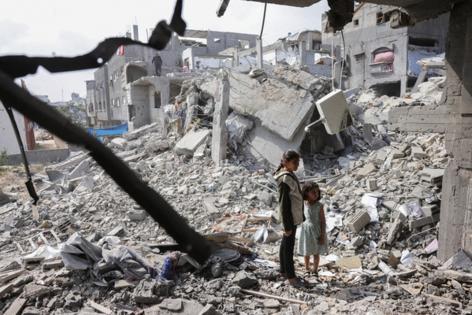Commentary: Out of food and under constant attack, we Gazans are dying every day
Published in Op Eds
No words can better capture the reality in Gaza today than this: We are dying.
Every day, in every imaginable way, we die. Death comes by missile, by gunshot, by collapsed building, by lack of medicine and by fear. And now, once again, it will come by hunger as Israel has closed off humanitarian supplies— with the agreement of not just the Trump administration but also the tacit support of the people of the U.S. and Europe who elected governments not committed to the rule of law and to stopping atrocities.
Many are responsible for the small wasted bodies that will soon be seen again on Western television screens.
Israeli Prime Minister Benjamin Netanyahu and President Donald Trump met again this month — from positions of power and comfort, deciding the fate of people they will never meet. In their decisions, Gaza’s children are reduced to collateral. Mothers, fathers and whole families are figures on a chessboard, disposable.
Our kitchens used to smell like home — warm spices, olive oil, bread baking in the early afternoon. Now they smell like nothing. Just metal cans and whatever dried goods we can scavenge. Stocks that were able to come in at scale during the ceasefire “have practically run out,” according to John Whyte of the United Nations relief agency for Palestinians.
For six weeks, no aid has entered Gaza because of the ongoing Israeli blockade. The United Nations World Food Program said Friday that it had run out of food in Gaza. More than 2.1 million people are trapped, bombed and starved.
When we can eat, it is only to survive, not to be full. Not to feel joy. Children line up for charity meals holding out plastic containers. Mothers break down while trying to quiet their babies’ hungry cries. Fathers stare at the ground, ashamed to be unable to provide for their families. We try to turn next to nothing into something, but even the imagination is tired.
Fruit, vegetables, meat — these are memories now. In the past, even under siege, we shared what little we had. But this time is different. Our shelves are bare.
How did it come to this? How did the world get to a place where the collective punishment of starvation is used as leverage to shape the terms of a ceasefire?
This isn’t a consequence of war. It’s a strategy. A deliberate and systematic Israeli effort — with Western acceptance — to make hunger a form of control. A way to turn a people into a population too weakened to resist oppression. This is not rationing. It’s removal.
And still, we remember who we are. We remember 1948, when our grandparents were forced from their homes. We remember 1967, when we were uprooted again. In every chapter, we held onto the land, planted in its soil.
But this time, Israel has taken the fields too. Israel has taken the water, the seeds and the hands that once tilled them. According to the human rights group Al-Haq, more than 70% of Gaza is now inaccessible to its residents, with reports indicating that Israel has seized more than 37% of the land.
And yet, how would you know? I am told CNN rarely covers us anymore. The people of Gaza don’t appear in breaking news alerts. We are made invisible by the editorial decisions of people who find our lives too political, too inconvenient — whose audiences have accepted our suffering as unremarkable.
Have you seen a mother dividing a single piece of bread among five children? Have you heard of the child who died from scalding after being knocked into a pot of food as a crowd scrambled for one meal? The stories sound unreal, but they’re not.
Even my cat is starving, and I don’t know how to help her. But some people can watch entire communities starve and feel nothing.
The same nations that speak of human rights in news conferences remain silent when those rights are trampled in Gaza. Even when South Africa brought a genocide case to the International Court of Justice, the court responded carefully — not a judgment, but a request: Stop bombing civilians, let aid in.
Even that was ignored. The bombs fell anyway. The aid was blocked. The request was drowned out by Israel’s allies — France, Germany, the U.S. — urging the court not to say the word “genocide.” As if language could hide the bodies.
This isn’t just about Gaza. It’s about the collapse of the very idea of justice. If the law bows to power, what is left for those without it?
People must choose what kind of legacy they want to leave behind. Will it be one of silence in the face of starvation and Israeli abuses? Or one of courage, where justice is more than just rhetoric?
We don’t need pity. We don’t need sympathy. We need rights. We need food. We need safety. A ceasefire is only the beginning. The siege, the apartheid, the multiple displacements — these are not footnotes. They are the story.
And one day, when this is over — when the horror is fully brought to light — the world will be asked: How did you let this happen?
____
Nour Khalil AbuShammala is a Palestinian trainee lawyer and human rights advocate based in Gaza City.
_____
©2025 Los Angeles Times. Visit at latimes.com. Distributed by Tribune Content Agency, LLC.




























































Comments